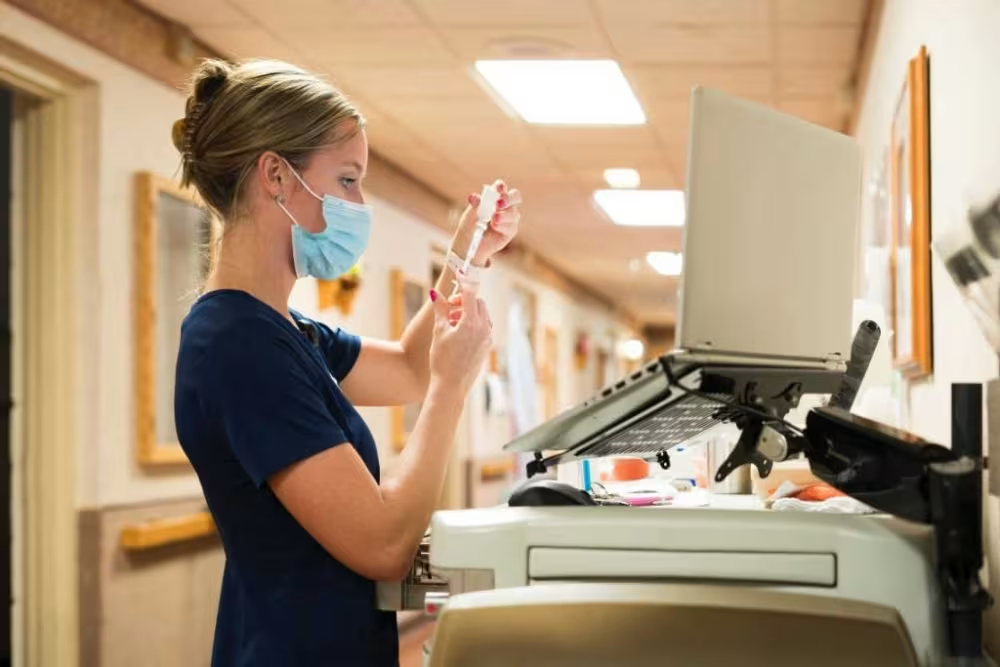16 Essential Nursing Skills for Success
Each blog post is dated and contains accurate information as of that date. Certain information may have changed since the blog post publication date. If you would like to confirm the current accuracy of blog information, please visit our ABSN overview page or contact admissions at 866.892.6463.
What skills do you need to be a nurse? Some of the most important nursing skills include clinical skills, such as medication management, injection administration, patient education and patient assessments. Other skills needed to be a nurse are soft skills, like communication, professionalism and adaptability.

What skills do you need to be a nurse? A registered nurse (RN) must rely on an extensive skill set, as they are responsible for the health and safety of their patients. Solid clinical skills are a must-have, such as medication management and wound care. Nurses also need soft skills like communication skills and critical thinking. You’ll have opportunities to develop all of the skills you’ll need during nursing school.
At Marian University’s Accelerated Bachelor of Science in Nursing (ABSN) program, our experienced nursing instructors guide our students in developing the essential skills needed to be a nurse. From interacting with patients to placing intravenous lines and more, you’ll learn everything needed to graduate fully prepared to tackle modern challenges in nursing. If you have completed a non-nursing bachelor’s degree or you’re a transfer student from our Associate of Science in Health Sciences degree program, you may be eligible to enroll and pursue a BSN degree in as few as 16 months.

Learn how to become an RN with a non-nursing bachelor’s degree.
When planning your nursing career, it’s a good idea to be familiar with why certain skills are important and what those skills are. Throughout your time in nursing school, reflect on the progress of your skill development and look for opportunities to practice and improve.
Understanding the Importance of Nursing Skills
A nurse needs to be prepared to handle any type of patient care scenario at any time, from allergic reactions to diabetic ketoacidosis and beyond. They also need to be able to work well with others, including other nurses and patients, and to handle any type of interpersonal issues. Because of the varied range of problems that nurses must solve in the workplace, they need to rely on a varied skill set.
Nursing skills can help RNs navigate complex patient care scenarios, work as a member of a team, advocate for patients, and stay in compliance with hospital protocols.
Top Hard Skills Needed to Be a Nurse
What skills do you need to be a nurse, exactly? Nurses need strong hard skills, such as the following:
1. CPR and BLS
Every nurse must be certified in cardiopulmonary resuscitation (CPR) and basic life support (BLS). CPR, used when a person’s heartbeat or breathing has stopped, involves manually pumping their blood and breathing air into their lungs. BLS is emergency care provided to individuals experiencing a medical emergency such as cardiac arrest, a blocked airway or respiratory distress. Aspiring nurses typically get certified in CPR and BLS from the American Red Cross prior to attending nursing school.
2. Patient Assessments
It’s essential for nurses to gather as much information as possible before making a clinical decision. To do this, nurses take patients’ medical histories, including their family medical histories. They ask about their patients’ medical conditions, medications, allergies and current symptoms. Then, they can perform head-to-toe patient assessments. They may:
- Take vital signs
- Listen to lung sounds and observe breathing patterns
- Assess joint range of motion
- Inspect for abnormalities of the ears, nose, and throat
- Palpate various body parts
3. Medication Management
Most types of nurses, with the exception of nurse practitioners, cannot prescribe medications. RNs can, however, administer medications prescribed by physicians. Attention to detail is important here, as RNs need to be sure they are administering the right type and dosage of medication.

4. Patient Transportation
Patient safety is critically important. Nurses need to know how to move hospital beds safely and how to help patients get to a vehicle upon discharge. They must also be able to teach patients how to use wheelchairs, walkers, crutches, and other mobility aids.
5. Patient Education
Patient education is one of the most important parts of a nurse’s job. It involves assessing the patient’s health literacy skills and adjusting the discussion accordingly. Patient education can include explaining a diagnosis, discussing treatment options and explaining self-care at home.
6. EMR Charting
Nurses need basic technology skills. They must be able to use the hospital’s electronic medical record (EMR) system to update patient records. This requires an understanding of nursing terminology and acronyms, as well as technical writing skills.
7. IV Placements
Nurses must often place intravenous (IV) lines in patients who are dehydrated or need IV medications. Some patients’ veins may prove more challenging than others. In addition, some patients have a fear of needles, so a calming demeanor is helpful.

8. Fall Prevention
Not all patients are steady on their feet, and a fall can cause serious injury and complicate the patient’s condition. Because of this, essential nursing skills include fall prevention. Nurses need to accurately assess a patient’s risk level and respond accordingly, such as by placing an alarm on the bed that alerts a nurse when the patient tries to get out of bed by themselves.
9. Infection Control
Hospital-acquired infections are a major concern in healthcare. Nurses need to do their part to reduce the risk of infection transmission to patients whenever possible. This includes infections spread through skin-to-skin contact, airborne pathogens, and infections from catheters.
10. Injections
Nurses must master the skill of administering injections to patients. Injections are used to deliver medications rapidly and to administer vaccinations. Nurses provide different types of injections, including intramuscular and subcutaneous injections.
11. Wound Care
Wound care is another important skill of a nurse. Nurses must properly assess the wound, clean it, removing damaged or infected tissue if necessary, and then apply the dressing. They must also monitor the wound, document any changes, and help patients learn how to care for the wound at home.
Need to improve your nursing resume? Try these six ways to stand out.

Essential Soft Skills for Nurses
In addition to clinical skills, nurses need a strong set of soft skills. Hard and soft skills work together to enable nurses to provide patient care effectively.
12. Communication Skills
One of the most important soft skills needed to be a nurse is communication. Nurses must be able to communicate effectively with all types of people, including patients, fellow nurses, other healthcare providers and patients’ family members. What’s more, they must often communicate in high-pressure situations, so keeping a level head is also a must.
13. Adaptability
Adaptability is another important nursing skill. Every shift brings new challenges, and so does every patient. Nurses need to adapt quickly to sudden changes in patients’ conditions or to their assigned tasks. They must also sometimes deal with last-minute shift changes.

14. Critical Thinking Skills
Nurses must be able to quickly assess clinical situations and then make informed decisions based on the available information. Critical thinking skills can apply to a range of situations, from evaluating new symptoms to verifying the accuracy of a prescribed medication.
15. Interpersonal Skills
Patients tend to interact with nurses more than with most other healthcare providers. It’s essential for nurses to build a strong, trusting relationship with their patients, and interpersonal skills are crucial for doing so. They are also essential for helping RNs work well with their coworkers, which can facilitate collaborative care and better patient outcomes.
16. Ethics and Professionalism
Nurses are required to adhere to high standards of ethical conduct. The American Nurses Association (ANA) has established a Code of Ethics for Nurses, which instructs nurses to practice with compassion, respect the dignity of every individual, and serve patients and their families with integrity and professionalism.

Explore the importance of patient advocacy in nursing.
Acquire Solid RN Skills at Marian University
Marian University is a non-profit school that delivers a rigorous nursing curriculum infused with Franciscan values. Our ABSN program teaches students to provide holistic patient care that respects the dignity of the individual. By providing personalized attention to each student and access to Academic Success Coaches, Marian University fully supports the progress of our students.
You can develop the skills of a nurse in as few as 16 months at our ABSN program. Contact our admissions advisors today to discover if you could be eligible to apply.
